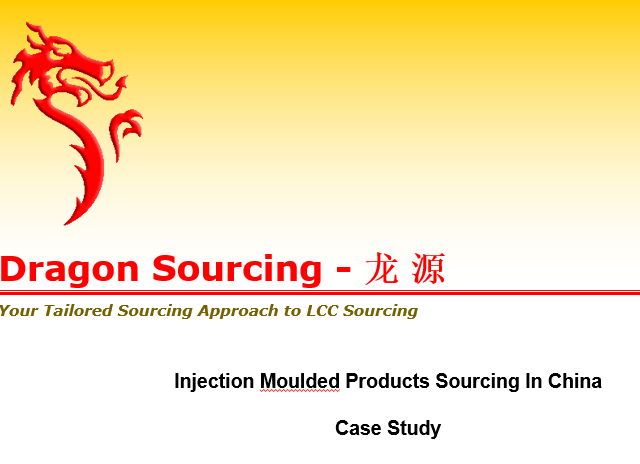
Sourcing injection moulded plastic, silicon, and metal parts from China can offer significant cost advantages and supply chain efficiencies. However, it also presents challenges related to supplier qualification, quality assurance, and transparency. This is where a structured sourcing process becomes essential.
In this blog, we dive into a real-world case study conducted by Dragon Sourcing, showcasing how they executed a sourcing project for injection moulded products in China through a meticulous and phased approach.
Project Overview
Objective:
To source plastic, silicon, FEP/FPM, and steel injection moulded components for a client by identifying, evaluating, and recommending competitive and capable suppliers in China.
Deliverables:
A curated supplier database
RFI-RFQ templates and analysis reports
Supplier profiles with rankings
Final recommendations
The Dragon Sourcing Approach
Dragon Sourcing followed a seven-step sourcing methodology, which ensured a thorough evaluation of the supply market:
1. Demand Analysis
The project began with defining the technical and commercial requirements, including:
Product specifications
Capacity needs
Materials and technologies used
Quality testing parameters
Required certifications
This helped align supplier screening with exact needs.
2. Supply Market Analysis
To identify potential suppliers, the team used a combination of:
B2B platforms
DS proprietary databases
Trade fair catalogs
Industry magazines
Business networks and referrals
3. Telephone Pre-Screening
Out of 30 potential suppliers contacted, only 21 passed the pre-screening based on criteria such as:
Manufacturing capability
Company size
Certification status
Willingness to sign NDA and participate
Suppliers failing to meet “must-have” criteria were disqualified early to streamline the process.
4. NDA Administration
Suppliers passing the phone screening were asked to sign an NDA provided by the client to protect sensitive information.
5. RFI-RFQ Development and Distribution
An RFI-RFQ template with a balanced scorecard approach was developed to assess:
Company background & financials
Client references and product experience
Certifications and quality systems
R&D and production capabilities
Corporate social responsibility
Only 14 suppliers responded to the RFI-RFQ, reflecting the effectiveness of earlier screening.
6. Analysis of RFI-RFQ Responses
Using the balanced scorecard, Dragon Sourcing objectively evaluated and ranked the suppliers. Each section was weighted to reflect the client’s priorities.
Top scoring areas included:
Production and QC management
Social responsibility
Cooperation willingness
7. Supplier Recommendation
Suppliers scoring highest across technical, financial, and operational dimensions were shortlisted for potential auditing and negotiation.
A forecast of total spend was also included in the final analysis to help the client make cost-effective decisions.
Results at a Glance
30 suppliers initially identified
21 passed phone screening
18 signed NDA
14 completed RFI-RFQ
Several suppliers recommended based on RFI scores ranging from 59 to 93
This process allowed the client to make data-driven sourcing decisions, reducing risks and increasing confidence in selecting the right partners.
Conclusion: Why This Case Study Matters
This case study is a testament to how structured sourcing—from demand analysis to final recommendation—can simplify complex procurement projects. By using Dragon Sourcing’s tailored approach, the client was able to efficiently navigate the fragmented supplier landscape in China and shortlist qualified vendors for injection moulded products.
If you’re considering sourcing from low-cost countries like China, working with experienced partners who offer transparent, step-by-step processes is essential to success.
Interested in Strategic Sourcing Services?
Learn how Dragon Sourcing can help you identify reliable suppliers, optimize costs, and improve your sourcing strategy in emerging markets.
Author’s Bio:
Pankaj Tuteja
Head of Operations – India
https://www.dragonsourcing.com




